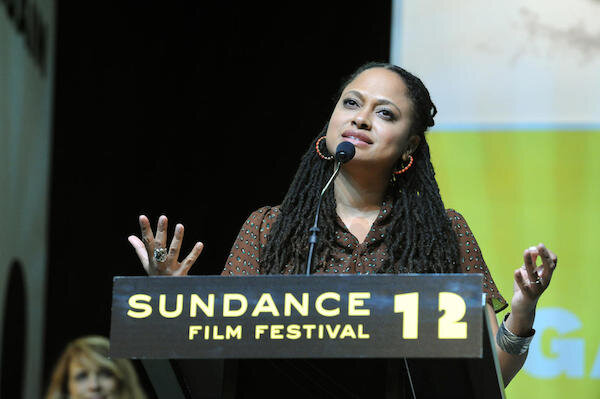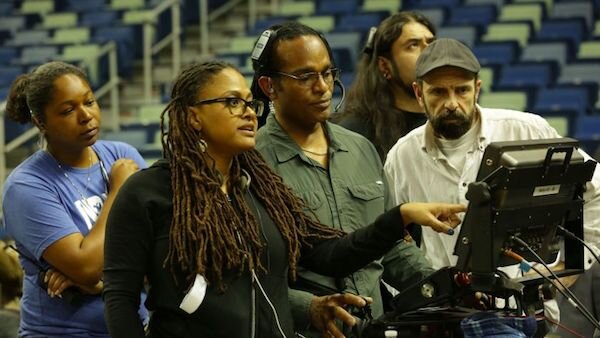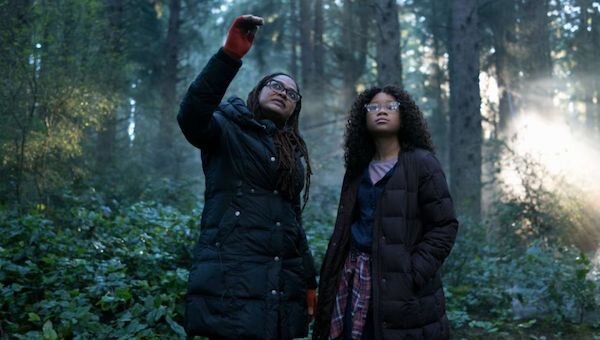Ava DuVernay is what Shonda Rhimes calls a First, Only Different – a trailblazer with enormous responsibility. But the filmmaker shoulders it with grace, influencing and championing a whole generation of young girls to break the rules and make their own magic. Ayanna Costley writes on the filmmaker’s incomparable achievements.
At the 2012 Sundance Film Festival, filmmaker Lynn Shelton presented the prestigious U.S. Directing Award to Ava DuVernay for her second feature film, Middle of Nowhere. Studios rejected the script, so with $200,000, Duvernay directed the film in 19 days – four more days than her first feature – but still less than half of the studio average of 40 days. She accepted the award humbly, declaring, "Just being in was enough," but celebrations still were in order. DuVernay became the first Black woman in the festival's 34-year history to win a directing award, a first of many trailblazing achievements she would see over the next few years.
Her historic Sundance win marked the start of her career as a full-time filmmaker, eight years after directing her first film, Saturday Night Life. It also ushered her into a select group of people Shonda Rhimes calls "First. Only. Different." Rhimes, Hollywood's highest-paid showrunner, explores the F.O.D. phenomenon in her book Year of Yes, noting that cultural trailblazers like DuVernay are "saddled with that burden of extra responsibility— whether you want it or not."
DuVernay has never shied away from speaking about this burden, mainly how marginalized filmmakers carry "the hopes and dreams of so many people with you," a weight that white men have the privilege of escaping. A mistake, or failure, could cost you, and those who follow you, opportunities. DuVernay had completed three short films, three television documentary series, two feature documentary films, and I Will Follow, her first feature film, by 2012. She admitted on Twitter that it still took winning an award at Sundance for Middle of Nowhere, a film that studios denied, for the film industry to gain confidence in her.
After winning one of the top awards at Sundance, Duvernay received three calls for work. None of them were for films. One came from Shonda Rhimes, who owned the biggest night on television with the TGIT (Thank God It's Thursday) programming on ABC. Rhimes tapped the filmmaker to direct an episode of Scandal, the first drama with an African American leading woman (Kerry Washington) on a network in 37 years. DuVernay's episode "Vermont is for Lovers Too" marks the first time that a Black woman directed a show starring a Black woman that was created by a Black woman on a Big 3 network. 8.93 million viewers watched live as Kandi Alexander's character, Maya, ravaged through her wrists to forge an escape plan, one of the series' most memorable (and deeply disturbing) moments. IndieWire put out a call for action, writing, "Let's hope that other showrunners and networks decide to hire DuVernay in 2014."
That year, the filmmaker continued her work in film, reuniting with Middle of Nowhere actor David Oyelowo and cinematographer Bradford Young for her historical drama Selma, the only film directed by a person of colour to receive a nomination at the 87th Academy Awards. Just two years later, in 2016, DuVernay’s first TV show, Queen Sugar, premiered on OWN. Just as Rhimes hired her, a woman filmmaker, to direct an episode of Scandal, DuVernay paid that experience forward by hiring 34 women to direct every episode of Queen Sugar, giving many their television directorial debut. DuVernay's show is the first television series in history to have every episode directed by women.
A month later, 13th premiered at the New York Film Festival, the first documentary ever to open the festival. Still, perhaps her most significant cultural trailblazing moment came in the highly anticipated film adaptation for Disney, of Madeleine L'Engel's classic A Wrinkle in Time. DuVernay became not just the first Black woman, but the first woman of colour, to direct a live-action movie with more than a $100 million budget.
Rhimes sums up the pressure that comes with being a F.O.D. in trailblazing moments like these and highlights the consequence of dropping the torch. In Year of Yes, she writes, "This wasn't just my shot. It was ours. I had to do everything right. I had to keep it all afloat. I had to run to the top of the mountain. I could not rest, I could not fall, I could not stumble, I could not quit. Failing to reach the summit was not an option. Failing would be bigger than just me. Blowing it would reverberate for decades to come."
There is an undeniable difference between Black women's experience in Hollywood and their white male counterparts. DuVernay nuanced this in a 2017 conversation with KPCC's Alex Cohen. "All they have to think about is, 'Do I make a bad movie? Do I go to director's jail for a film or two and can I get another movie?' With women and people of colour, it's, 'Does this close the door to other people having this opportunity?'" These sentiments are not just the perceived feelings of two of Hollywood's best storytellers. The disparity is real, and there is evidence to support it. U.S.C.'s Annenberg Inclusion Initiative reported that while men usually make anywhere between one and 17 films throughout their career, women filmmakers typically only make between one and four. The weight of the burden can, and does, result in real consequences.
Even with the looming pressure of being a Black woman filmmaker in Hollywood and always being reminded of it, DuVernay compartmentalized, placing her focus on the worlds she was building in her films. For her first narrative feature, I Will Follow, the director studied independent films and created a powerful vignette of grief. Middle of Nowhere challenged the sophomore filmmaker to understand the worlds of real-life women, who, like the film’s protagonist Ruby, hovered in a liminal space while their partners remained incarcerated. Selma saw DuVernay, the project's seventh (and final) director, wrestling with history and looking back to the summers she spent with her father in Alabama. While headlines for A Wrinkle in Time focused on the filmmaker’s status as a "first," she busied her mind by constructing a magical world of a Black girl in South Compton actualizing her power.
Even if the resources, budgets, and opportunities that come with working with large studios were snatched from her because of a perceived failure, for DuVernay, it would not matter. She'd make more opportunities, as she has done for herself since harnessing her power as a storyteller and deciding to become a filmmaker after a successful career as a publicist. After all, she came into the game creating and funding her films herself. Along the way, she turned losses into wins. She founded her own film distribution company, AFFRM, in 2010, now known as Array, after failing to receive distribution for I Will Follow. Storytelling by any, or indie, means necessary characterizes DuVernay’s career and remains at the center of what she does, no matter the medium.
DuVernay never settled for just being a "first," moving beyond her visibility and leveraging her wins and resources to pull others up as she continued to climb. The Ava Effect has infiltrated the industry, but her impact on emerging, independent storytellers is as powerful as it is personal. DuVernay built a rapport with then student-filmmaker Cierra "Shooter" Glaude, while Glaude studied at the University of Alabama, before offering her an assistant position on a pilot. Glaude dropped out of college and instead enrolled at the DuVernay School of Film, assisting on DuVernay’s For Justice pilot with CBS, working for AFFRM/Array, and returning to her home state of Alabama for Queen Sugar. Glaude’s short film, Last Looks starred Queen Sugar's Rutina Wesley, who offered to be in the emerging filmmaker's movie – a testament to the community DuVernay surrounds herself with. Most recently, Glaude announced she secured an independent movie deal, but has not released any details at the moment.
More than once, DuVernay ensured that while she may be the first Black woman to win a directing award at Sundance, the first to run a show with an all-woman directorial roster, and the first woman of color to direct a studio film with $100 million, among many other impressive achievements, she will not be the last. DuVernay's actions prove that she holds tight to this notion, operating from a special place of passion, generosity, and gratitude. She didn't follow the rules as they were written, nor did she ask permission to play; instead, she disrupts the game itself, and unhesitantly carries with her a village of storytellers. She was a first on many trailblazing fronts, but she will not be the only one. Firmly rooted in community, storytelling, and self-determination, Ava DuVernay and her impact on the entertainment industry are here to stay.
Ayanna Costley (@ayannacostley) is film and music writer from Newark, New Jersey. She currently interns at A24 Films which is fitting because her favorite movie is Moonlight. You can find more of her writing here.



